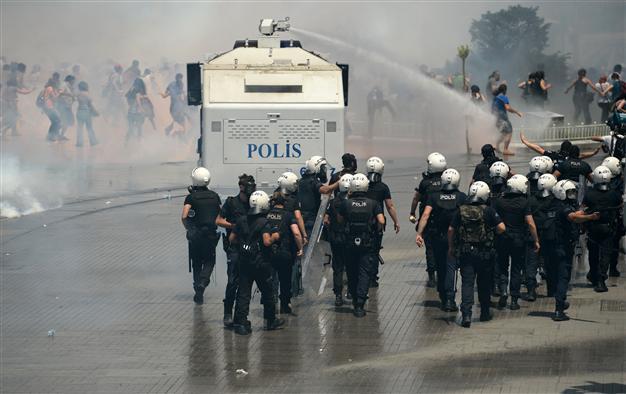Council of Europe warns on Turkey freedoms
ANKARA - Agence France Presse

DAILY NEWS photo, Emrah Gürel
The Council of Europe warned Tuesday that Turkish police action against non-violent demonstrators during the wave of anti-government protests in June could have a "chilling effect" on freedoms in a country seeking to join the European Union."The police's handling of demonstrations in Turkey exposes once again the long-standing, serious human rights problem of the misconduct of law enforcement officials in the country," Nils Muiznieks, Council of Europe Commissioner for Human Rights, said in a report after a fact-finding visit to Turkey in July.
"It is time for the Turkish police to improve their record of compliance with human rights standards," he said. What began as a peaceful environmentalist campaign against plans to demolish Istanbul's Gezi Park, one of the city's last major green spots, snowballed into three weeks of nationwide protests against Prime Minister Recep Tayyip Erdogan.
The police crackdown was often heavy-handed and the clashes left at least six people dead and 8,000 injured.
"Misconduct of law enforcement officials poses a direct threat to the rule of law," said Muiznieks.
"In no circumstances can human rights violations committed by them be tolerated or encouraged: progress is needed to ensure that all allegations are investigated adequately and followed by dissuasive sanctions where appropriate." The commissioner said he was "deeply concerned" that doctors, lawyers, academics, students, unions and journalists became the target of investigations, fines or dismissals because of their non-violent action during the protests. "I am particularly worried about the chilling effect that these measures could have on free assembly and expression, as well as on media freedom," he said.
He warned Turkish authorities to refrain from any measures that could be perceived as "reprisals" against peaceful demonstrators or their sympathisers. Turkey has a poor record on media freedom, and the US-based Committee to Protect Journalists last year blacklisted the country as the leading jailer of journalists.
Rights groups say the situation has deteriorated since the June protests, with journalists covering the street clashes reportedly becoming frequent targets of police abuse.
Dozens of journalists seen as critical of the government have been sacked or compelled to resign, according to the Turkish journalists' union. A top Turkish judge on Monday also launched a strident attack at what he described as government efforts to manipulate the media. "Attempts to silence the media for commercial or political purposes are increasing the importance of the media regarding freedoms in a democratic system," said Alparslan Altan, deputy chief of the Constitutional Court.
Anti-government activists have denounced what they say is the submissive attitude of many Turkish media outlets to Erdoğan's ruling Justice and Development Party (AKP).
The report by the pan-European rights body was issued just three weeks after the EU resumed membership talks with Turkey, ending a 40-month freeze.
















